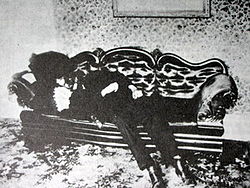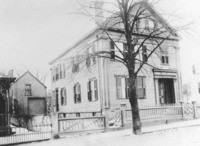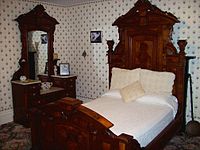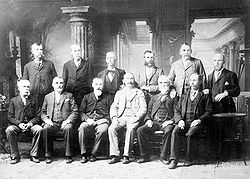- Lizzie Borden
-
For other people named Lizzie Borden, see Lizzie Borden (disambiguation).
Lizzie Borden 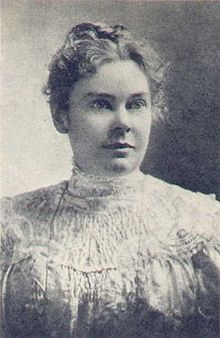
Lizzie Borden, circa 1889Born Lizzie Andrew Borden
July 19, 1860
Fall River, Massachusetts, United StatesDied June 1, 1927 (aged 66)
Fall River, Massachusetts, United StatesResting place Oak Grove Cemetery Nationality American Known for Murder trial defendant Net worth ~$1,000,000 (1927)[1]
($25 million today)Parents Andrew Jackson Borden (1822–1892)
Sarah Anthony Morse (1823–1863), mother
Abby Durfee Gray (1828–1892), stepmotherRelatives Emma Lenora Borden (1851–1927), sister
Alice Esther Borden (1856–1858), sister
John Vinnicum Morse, uncleLizzie Andrew Borden[2] (July 19, 1860 – June 1, 1927) was a woman in New England who allegedly killed her father and stepmother with a hatchet on August 4, 1892, in Fall River, Massachusetts, in the United States. The murders, subsequent trial, and ensuing trial by media became a cause célèbre. Although Lizzie Borden was acquitted, no one else was ever arrested or tried and she has remained a notorious figure in American folklore. Dispute over the identity of the killer or killers continues to this day. The fame of the incident has endured in American pop culture and criminology.
Contents
Murders
On August 4, 1892, Andrew Borden had gone into Fall River to do his usual rounds at the bank and post office. He returned home at about 10:45 a.m.; Lizzie Borden claimed that she found his body about 30 minutes later.[citation needed]
During the murder trial, the Bordens' twenty-six year old maid, Bridget Sullivan, testified that she was lying down in her room on the third floor of the house shortly after 11:00 a.m. when she heard Lizzie call to her, saying someone had killed her father; his body was found slumped on a couch in the downstairs sitting room. Andrew Borden's face was turned to the right hand side, apparently at ease, as if he was asleep.[3]
Shortly thereafter, while Lizzie was being tended by neighbors and the family doctor, Sullivan discovered the body of Abby Borden in the guest bedroom located upstairs. Both Andrew and Abby Borden had been killed by crushing blows to their skulls from a hatchet. Andrew Borden's left eyeball was cleanly split in two.[4]
Motive and methods
The upstairs floor of the house was divided. The front was occupied by the Borden sisters, Lizzie and Emma while the rear was occupied by Andrew and Abby. Meals were seldom eaten together. Andrew was known by family, friends, and business associates as tight-fisted and generally rejected modern conveniences. The family still threw their excrement buckets (slops) onto the backyard. The two daughters, well past marriage age, gladly entered the modern outside world whenever they visited friends.
Conflict had increased between the two daughters and their father about his decision to divide the valuable properties among relatives before his death. Relatives of their stepmother had been given a house, and the two sisters demanded and received a rental property. They later sold this property to their father for cash.[2][5] John Morse, brother to the deceased Sarah Borden, had come to visit on the week of the murders. His visit was to facilitate transfer of Swansea farm property, which had been the summer home for the Borden family. Shortly before the murders, a major argument had occurred which resulted in both sisters leaving home on extended "vacations".
The barn behind the home did not see much use after Andrew sold the horse. Lizzie had some pigeons in cages on the second floor that she fed and watered. She arrived one day to find the pigeons lying on the ground with their heads chopped off. Andrew said he killed them with an axe because the birds were attracting young boys in the neighborhood to the barn, and he felt they might get hurt or start a fire.[5]
Lizzie had attempted to purchase prussic acid (hydrogen cyanide) from local druggist Eli Bence, but Bence refused. Lizzie claimed she planned to use it to clean a seal skin cloak;[6] the defense argued that this incident was not admissible evidence.
Shortly before the murders, the entire household became violently ill. As Mr. Borden was not a popular man in Fall River, Abby feared they were being intentionally poisoned. The family doctor, however, diagnosed their illness as food poisoning. Andrew Borden had purchased cheap mutton for the family to eat, and they left it on the stove for days, used for multiple meals. The family believed the milk was being tainted by someone; after the murders, the milk was tested but nothing was found that could be connected to their illness. Both murder victims had their stomachs removed in an autopsy performed in the Borden dining room on the day of their deaths. The stomachs, with their contents, were packaged and sent to Harvard Medical School to be examined for toxins; nothing was found.[7]
The trial
Lizzie Borden was arrested and jailed on August 11, 1892; a grand jury began hearings on November 7, 1892. After evidence was presented, a bill of indictment for murder was delivered on December 2, 1892. Her murder trial at New Bedford, Massachusetts was not until June 1893.[7] She was defended by former Massachusetts governor George D. Robinson, Andrew V. Jennings.[8], and Melvin O. Adams. One of the prosecutors in the trial was William H. Moody, a future United States Attorney General and Associate Justice of the U.S. Supreme Court.
During the police investigation, a hatchet was found in the basement and was assumed to be the murder weapon.[8] Though it was clean, most of its handle was missing and the prosecution stated that it had been broken off because it was covered with blood. Police officer Michael Mullaly testified that he found the head of the hatchet next to a hatchet handle; Deputy Marshall John Fleet contradicted this testimony. Later, a forensics expert said there was no time for the hatchet to be cleaned after the murder.[9] The prosecution was hampered by the fact that the Fall River police did not put credence in the then-new forensic technology of fingerprinting, and refused to take prints from the hatchet.[10]
No blood-soaked clothing was found as evidence by police. A few days after the murder, Lizzie tore apart and burned a blue dress in the kitchen stove, claiming she had brushed against fresh baseboard paint that had smeared on it.[8]
Despite incriminating evidence and testimony presented by the prosecution, Lizzie was acquitted on June 20, 1893, after the jury deliberated only an hour and a half.[8] The fact that no murder weapon was found and no blood evidence was noted just a few minutes after the second murder pointed to reasonable doubt. Her entire original inquest testimony[2] was barred from the trial. Also excluded was testimony regarding her attempt to purchase prussic acid.[6] Adding to the doubt was another axe murder which took place shortly before the trial and was perpetrated by a man named José Correira. While many of the details in both murders were similar, Correira was proven to be out of the country when the Borden murder took place.[11]
After the trial, Lizzie and Emma Borden moved to a new house that Lizzie christened Maplecroft,[8] located on French Street, then a fashionable neighborhood in Fall River. The large home included indoor plumbing and private bathrooms. The sisters settled all claims against them from Abby's side of the family, giving Abby Borden's family members everything they wanted in order to avoid further lawsuits. Because it was proven that Abby died before Andrew, all of her estate legally went to Andrew, with Andrew's estate going to his daughters. The settlement reached between the Borden sisters and Abby's two sisters was substantial.[7][12]
In June 1905, after twelve years, Lizzie and Emma Borden became estranged over differences in their lifestyles. Shortly after arguing over a party Lizzie had given for Nance O'Neil and her theater friends,[13] Emma moved out of the house to live with her close friend Alice Lydia Buck. After the separation from her sister, Borden began using the name "Lizbeth A. Borden", rather than "Lizzie".[7][12]
Death
Following the surgical removal of her gallbladder, Lizzie was ill the last year of her life. Her private staff were the sole witnesses to her decline. Borden died of pneumonia on June 1, 1927 in Fall River, Massachusetts. Borden's funeral details were not made public and few people attended her burial.[14] Borden was buried in Oak Grove Cemetery under the name "Lizbeth Andrew Borden", her footstone was inscribed "Lizbeth".[15] Borden had never married, and her will, probated from June 25, 1927 through March 24, 1933, left $30,000 to the Fall River Animal Rescue League.[16][17] She also left $500 in perpetual trust for the care of her father's grave. Much of her wealth was transferred to her cousin Grace H. Howe, and her closest friend Helen Leighton. The final probate in 1933 gave them almost $6,000 each in the middle of the Great Depression.[1]
Nine days later, on June 10, 1927,[15] her sister Emma died from chronic nephritis[18] in the home she shared with her friend and nurse Annie C. Connor, located in Newmarket, New Hampshire. She moved there due to the infirmities of old age, and to get away from the notoriety brought on by a new book about the murders.
The house on Second Street where the murders were committed is currently a bed and breakfast.[19] Maplecroft, Borden's house at 306 French Street, is a privately-owned residence, but the owners will conduct tours, by appointment only.[20]
Conjecture
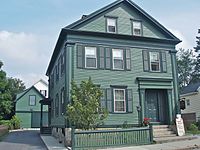 The Borden house as it appears now; it is located in the Corky Row Historic District of Fall River
The Borden house as it appears now; it is located in the Corky Row Historic District of Fall River
Several theories have been presented over the years suggesting Lizzie Borden may not have committed the murders, and that other suspects may have had motives. One theory is that the Bordens' maid, Bridget Sullivan, actually committed the murders. This theory suggests that Sullivan was angry with the Bordens for being asked to clean the windows, a taxing job on a hot day, and just one day after having suffered from food poisoning.[21] Another potential suspect was suggested by Arnold R. Brown in his work, Lizzie Borden: The Legend, The Truth, The Final Chapter. In his book, Brown theorizes that the murderer was William Borden, Andrew Borden's illegitimate son and the half-brother of the Borden sisters. Brown believes that Lizzie's half brother committed the murders out of revenge following his failed efforts to extort money from his father.
Yet another theory is that Lizzie suffered temporal lobe seizures during her menstrual cycle. During these seizures, Lizzie was known to enter a fugue state which, as this theory suggests, would have allowed her to unknowingly commit the murders.[22]
Nance O'Neil
Two Borden biographers, Evan Hunter and David Rehak, contend that she had an intimate relationship with actress Nance O'Neil, whom she met in Boston in 1904.[5] The pair got along well, despite Lizzie's notoriety.[13] The friendship was cited as the cause of Emma's final separation from her sister.[13]
O'Neil was later portrayed as a character in a musical about Borden, entitled Lizzie Borden: A Musical Tragedy in Two Axe. Actress Suellen Vance originated the role.[23]
Public reaction
The trial received a tremendous amount of national publicity. It has been compared to the later trials of Bruno Hauptmann, Ethel and Julius Rosenberg and O.J. Simpson as a landmark in media coverage of legal proceedings.[24][25][26][27][28][29]
The case was memorialized in a popular skipping-rope rhyme:[30]
-
- Lizzie Borden took an axe
- And gave her mother forty whacks.
- When she saw what she had done
- She gave her father forty-one.
Folklore says the rhyme was made up by an anonymous writer as a tune to sell newspapers. Others attribute it to the ubiquitous, but anonymous "Mother Goose".[31] In reality Lizzie's stepmother suffered 18[32] or 19[9] blows and her father just 11 blows. Even though she was acquitted, Lizzie was ostracized by neighbors after the trial.[9] Lizzie Borden's name was again brought into the public eye when she was accused of shoplifting in 1897.[15] In 1961, the folk group The Chad Mitchell Trio recorded a humorous song called "Lizzie Borden" about the murders.
Genealogy
Andrew Jackson Borden married Sarah Anthony Morse on December 25, 1845. They had three children: Emma Lenora in 1851; Alice Esther in 1856; and Lizzie Andrew in 1860. Alice Esther died in 1858. Sarah Anthony Borden died in 1863. Andrew married a second wife, Abby Durfee Gray, on June 6, 1865. Andrew and Abby Borden died in 1892, and Emma and Lizzie died in 1927. They are all buried in the Borden Family Plot in Oak Grove Cemetery.
Lizzie was a distant relative of the American milk processor Gail Borden (1801–1874) and Robert Borden (1854–1937), Canada's Prime Minister during World War I.[33]
Lizzie Borden and actress Elizabeth Montgomery, who coincidentally portrayed Lizzie in a television movie about the murders and trial, were sixth cousins once removed. Both women descended from 17th-century Massachusetts resident John Luther. Rhonda McClure, the genealogist who documented the Montgomery-Borden connection, said, "I wonder how Elizabeth would have felt if she knew she was playing her own cousin."[34]
Television and film
- Alfred Hitchcock Presents, season 1, episode 17, "The Older Sister" (first aired 1956), was a fictional story suggesting that it was Emma Borden who committed the murders, and that Lizzie endured the trial and subsequent notoriety to protect her older sister. A similar story titled "Goodbye Miss Lizzie Borden" was a 1955 episode of Suspense.
- Armstrong Circle Theatre, season 12, episode 1, "Legend of Murder – The Untold Story of Lizzie Borden" (first aired October 11, 1961), was a dramatization of Edward D. Radin's book Lizzie Borden: The Untold Story (Simon and Schuster, 1961), which put forth the theory that Bridget Sullivan was the actual murderess. Borden was portrayed by Clarice Blackburn and Bridget by Mary Doyle.
- Elizabeth Montgomery depicted Borden in William Bast's two hour television movie, The Legend of Lizzie Borden (1975).
- In 2004, the Discovery Channel aired an investigative documentary called Lizzie Borden Had an Axe. In the episode, a pair of detectives used modern forensics to exonerate Sullivan and indicate that Borden could have been the killer.
- In 2011 Dark Morgue Pictures produced a film entitled Lizzie, based on events that happened on the day of the murders.
- In 2011 the 'Ghost Adventures Crew' (GAC) investigated the Lizzie Borden house and were said to have discovered the reasons for the killing of her parents but thought it best not to be made public. [35]
Theater
- Composer Morton Gould and choreographer Agnes de Mille created a ballet based on the life of Borden in 1948, entitled Fall River Legend.[36]
- Composer Jack Beeson, librettist Kenward Elmslie, and scenarist Richard Plant created an opera, Lizzie Borden, in 1965.
- The anthology of short plays, "Sepia and Song," contained a play called "A Memory of Lizzie," with scenes from Borden's childhood interpersed with quotes from her trial.[37]
- Blood Relations by Sharon Pollock premiered at Theatre Tree, Edmonton Canada in 1980. The play is set in 1902, with its "dream thesis" set in 1892, at Fall River, Massachusetts. It explores the events leading up to the trial.[citation needed]
- The Testimony of Lizzie Borden by Eric Stedman, a docudrama staged in an accurate reproduction of the Borden sitting room which re-created much of Borden's actual inquest testimony, premiered at Theatre on the Towpath in New Hope, Pa. in 1994 and was presented in Fall River in 1995.[citation needed]
- Lizzie Borden's Tempest by Brendan Byrnes played the New York International Fringe Festival in 1998. As Borden reads the role of Miranda in The Tempest with her local theatre club, Shakespeare's storm resurrects and reunites the Borden Family. The play's central idea is based on an actual program displayed at the Fall River Historical Society that lists a "Miss Borden" playing the role of Miranda in The Tempest.[38]
- Lizzie Borden, a 1999 musical with music by Christopher McGovern and book and lyrics by Christopher McGovern and Amy Powers. The production was directed and choreographed by Bill Castellino and starred Tony-nominee, Alison Fraser.
- Lizzie Borden Took an Axe (3 men, 6 women) by Garrett Heater premiered in Syracuse, NY in 2010. The play begins with the Borden house robbery of 1891, traces the events leading up to, during, and after the murders, utilizing all the major players from the event, and ends with a monologue for Lizzie, the cryptic "noisy bird letter" to her Maplecroft neighbor Mr. Brayton in May, 1900.
- The Lights Are Warm And Coloured by William Norfolk, published by Samuel French, 1980. This is an unusual play as it is written for two men and six women. Set during the party given by Lizzie for Nance O'Neil, Lizzie and Emma watch as Nance, and her troupe (Annie, Tom and Henry) re-enact the scenes of twelve years earlier, to no conclusion. After the troupe leaves for the night, there is an unexpected visitor, Bridget Sullivan, implied to be the "real killer".[39]
- "Lizzie Borden", a novel by Elizabeth Engstrom, fictionalizes the Borden story.
See also
Citations
- ^ a b "Bequest for Tomb of Slain Father" (fee required). The New York Times. June 8, 1927. http://select.nytimes.com/gst/abstract.html?res=FA0B14FB395B1B728DDDA10894DE405B878EF1D3. Retrieved 2011-04-19.
- ^ a b c "Inquest Testimony of Lizzie Borden". University of Missouri–Kansas City School of Law. http://law2.umkc.edu/faculty/projects/ftrials/LizzieBorden/bordeninquest.html. Retrieved 2011-04-19. "Q. Give me your full name.
A. Lizzie Andrew Borden.
Q. Is it Lizzie or Elizabeth?
A. Lizzie.
Q. You were so christened?
A. I was so christened." - ^ "Testimony of Bridget Sullivan in the Trial of Lizzie Borden". University of Missouri–Kansas City School of Law: Famous Trials. http://law2.umkc.edu/faculty/projects/ftrials/LizzieBorden/sullivantestimony.html. Retrieved 2011-04-19.
- ^ Porter, Edwin H. (1893). The Fall River Tragedy: A History of the Borden Murders. Fall River: Press of J.D. Munroe. http://ccbit.cs.umass.edu/lizzie/images/documents/L0015F01.html. Retrieved 2011-04-19.
- ^ a b c Rehak, David (2005). Did Lizzie Borden Axe for It?. Just My Best Publishing Company. pp. 67–69. ISBN 1450550185. http://books.google.com/?id=1BeURuHcuooC&printsec=frontcover&dq=Did+Lizzie+Borden+Axe+for+It#v=onepage&q&f=false. Retrieved 2011-04-19.
- ^ a b "Prussic Acid In The Case". New York Times. June 15, 1893. http://query.nytimes.com/gst/abstract.html?res=9E03E6D91431E033A25756C1A9609C94629ED7CF. Retrieved 2011-04-19.
- ^ a b c d Cantwell, Mary (July 26, 1992). "Lizzie Borden Took an Ax". The New York Times. http://www.nytimes.com/1992/07/26/magazine/lizzie-borden-took-an-ax.html. Retrieved 2011-04-19.
- ^ a b c d e Linder, Doug. "The Trial of Lizzie Borden". University of Missouri–Kansas City School of Law: Famous Trials. http://www.law.umkc.edu/faculty/projects/ftrials/LizzieBorden/bordenaccount.html. Retrieved June 14, 2008.
- ^ a b c Adams, Cecil (March 13, 2001). "Did Lizzie Borden kill her parents with an axe because she was discovered having an affair?". The Straight Dope. http://www.straightdope.com/mailbag/mlizzieborden.html. Retrieved November 21, 2008.
- ^ "On this day in crime history." The Washington, D.C. Examiner. August 4, 2008.
- ^ Noe, Denise (October 1999). "The Murderer Who Inadvertently Helped Miss Lizzie". The Lizzie Borden Quarterly: 8. http://www.lizzieandrewborden.com/NewResearch/NewResearchArticles/NoeMurderer.htm. Retrieved June 3, 2008.
- ^ a b "Cast of Characters". LizzieAndrewBorden.com. http://www.lizzieandrewborden.com/CrimeLibrary/CastofCharacters.htm. Retrieved June 13, 2008.
- ^ a b c "Sisters Estranged Over Nance O'Neill". The San Francisco Call. June 7, 1905. http://en.wikipedia.org/wiki/Image:Borden-Lizzie_1905.gif. Retrieved June 13, 2008.
- ^ "Few at Borden Burial" (fee required). The New York Times. June 6, 1927. http://select.nytimes.com/gst/abstract.html?res=F40817FF395912738DDDAF0894DE405B878EF1D3. Retrieved June 13, 2008.
- ^ a b c "Dates in the Borden Case". The Fall River Historical Society. Archived from the original on February 5, 2008. http://web.archive.org/web/20080205025834/http://www.lizzieborden.org/bordendates.htm. Retrieved 24 November 2010.
- ^ "Lizzie Borden's Will Is Probated". The New York Times. Associated Press. June 25, 1927.
- ^ "Lizzie Borden's Last Will and Probate Records" (PDF). Lizzieandrewborden.com. http://www.lizzieandrewborden.com/pdf%20files/Lizzie%27s%20last%20will.pdf. Retrieved June 13, 2008.
- ^ The Cases That Haunt Us. books.google.com. 2001. ISBN 9780743212397. http://books.google.com/?id=ACNZzKGWdbwC&pg=PA117&lpg=PA117&dq=emma+borden+nephritis&q=emma%20borden%20nephritis. Retrieved April 19, 2009.
- ^ "Lizzie Borden Bed & Breakfast". http://www.lizzie-borden.com/. Retrieved November 15, 2007.
- ^ Dark Destinations - Maplecroft
- ^ Kent, David (1992). "4". Forty Whacks: New Evidence in the Life and Legend of Lizzie Borden (1 ed.). Emmaus, PA: Yankee Books. p. 39. ISBN 0899093515.
- ^ Lincoln, Victoria (1967). "1". A Private Disgrace: Lizzie Borden by Daylight (Book Club ed.). New York: G.P. Putnam's Sons. pp. 44–60. ISBN 0930330358.
- ^ Suellen Vance ∙ Professional Actress ∙ New York City.
- ^ Chiasson, Lloyd Jr (1997). The Press on Trial: Crimes and Trials as Media Events. Westport, CT: Greenwood Press. ISBN 0313300224.
- ^ Knox, Sara L. (1998). Murder: A Tale of Modern American Life. Duke University Press. ISBN 0822320533.
- ^ Cramer, Clayton E. (1994). "Ethical Problems of Mass Murder Coverage in the Mass Media". Journal of Mass Media Ethics 9.
- ^ Beschle, Donald L. (1997). "What's Guilt (or Deterrence) Got to Do with It?". William and Mary Law Review 38.
- ^ Eaton, William J. (December 1995). "Just like O.J.'s Trial, but without Kato". American Journalism Review 17.
- ^ Scott, Gina Graham (2005). Homicide by the Rich and Famous: A Century of Prominent Killers. Greenwood Publishing Group. ISBN 0275983463.
- ^ Lizzie Borden
- ^ Mother Goose's Melodies - Google Books
- ^ "Lizzie Borden Took An Ax". Crime Library. http://www.trutv.com/library/crime/notorious_murders/famous/borden/index_1.html. Retrieved November 21, 2008.
- ^ Cole, Michael S. M.D. (1994). Cowan Connections. Privately published. pp. 374–380. http://www.thecolefamily.com/hobby/borden.htm. Retrieved November 21, 2008.
- ^ Pylant, James (2004). "The Bewitching Family Tree of Elizabeth Montgomery". Genealogy Magazine. http://www.genealogymagazine.com/elmo.html. ""Rhonda R. McClure. Finding Your Famous (& Infamous) Ancestors. (Cincinnati: Betterway Books: 2003), pp. 14-16."
- ^ "The "Ghost Adventures Crew" Survive A Very Long Night Locked Down Inside the House of Axe Murderer Lizzie Borden". http://www.feelguide.com/2011/10/29/the-ghost-adventures-crew-survive-a-very-long-night-locked-down-inside-the-house-of-axe-murderer-lizzie-borden/. Retrieved 2011-11-03.
- ^ Fall River Legend
- ^ Foxton, David (1987). Sepia and Song: A Collection of Historical Documentaries. Nelson Thornes. pp. 1–32. ISBN 978-0174324096. http://books.google.com/?id=-Ldsk-F-z0MC.
- ^ "Schedule of New York International Fringe Festival". nytheatre-wire.com. http://www.nytheatre-wire.com/fringe.htm. Retrieved 24 November 2010.
- ^ "Lizzie Borden: Warps and Wefts, admin showing the purchase of a copy of the script". http://lizziebordenwarpsandwefts.com/2007/10/03/the-lights-are-warm-and-coloured/. Retrieved 2011-04-19.
Further reading
A number of works expounding the facts and different theories have been written about the crime. These include:
- Asher, Robert, Lawrence B. Goodheart and Alan Rogers. Murder on Trial: 1620—2002 New York: State University of New York Press, 2005, ISBN 978-0791463772.
- Brown, Arnold R. Lizzie Borden: The Legend, the Truth, the Final Chapter. Nashville, TN: Rutledge Hill Press, 1991, ISBN 1-55853-099-1.
- de Mille, Agnes. Lizzie Borden: A Dance of Death. Boston: Little, Brown and Co., 1968.
- Kent, David Forty Whacks: New Evidence in the Life and Legend of Lizzie Borden. Yankee Books, 1992, ISBN 0-89909-351-5.
- Kent, David The Lizzie Borden Sourcebook. Boston: Branden Publishing Company, 1992, ISBN 0-8283-1950-2.
- King, Florence. WASP, Where is Thy Sting? Chapter 15, "One WASP's Family, or the Ties That Bind." Stein & Day, 1977, ISBN 0-552-99377-8 (1990 Reprint Edition).
- Lincoln, Victoria. A Private Disgrace: Lizzie Borden by Daylight. NY: G.P. Putnam’s Sons, 1967, ISBN 0-930330-35-8.
- Masterton, William L. Lizzie Didn’t Do It! Boston: Branden Publishing Company, 2000, ISBN 0-8283-2052-7.
- Pearson, Edmund Lester. Studies in Murder Ohio State University Press, 1924.
- Pearson, Edmund Lester. Trial of Lizzie Borden, edited, with a history of the case, Doubleday-Doran, 1937. Main text is a transcript of the trial.
- Radin, Edward D. Lizzie Borden: The Untold Story Simon and Schuster, 1961.
- Rebello, Leonard. Lizzie Borden: Past & Present Al-Zach Press, 1999.
- David Rehak. Did Lizzie Borden Axe For It? Angel Dust Publishing, 2008.
- Spiering, Frank. Lizzie: The Story of Lizzie Borden. Dorset Press, 1991, ISBN 0-88029-685-2.
- Sullivan, Robert. Goodbye Lizzie Borden. Brattleboro, VT: Stephen Greene Press, 1974, ISBN 0-14-011416-5.
- Hunter, Evan (see Artistic depictions/Prose Fiction, below) has a video out called Reopened: Lizzie Borden with Ed McBain.
External links
- The Hatchet: The Journal of Lizzie Borden Studies
- R. Digati (Jan 01, 2001). "Lizzie Andrew Borden". Alleged Murderess. Find a Grave. http://www.findagrave.com/cgi-bin/fg.cgi?page=gr&GRid=115. Retrieved Aug 18, 2011.
Categories:- 1860 births
- 1927 deaths
- 1892 crimes
- American folklore
- People acquitted of murder
- People from Fall River, Massachusetts
- Unsolved murders in the United States
-
Wikimedia Foundation. 2010.

